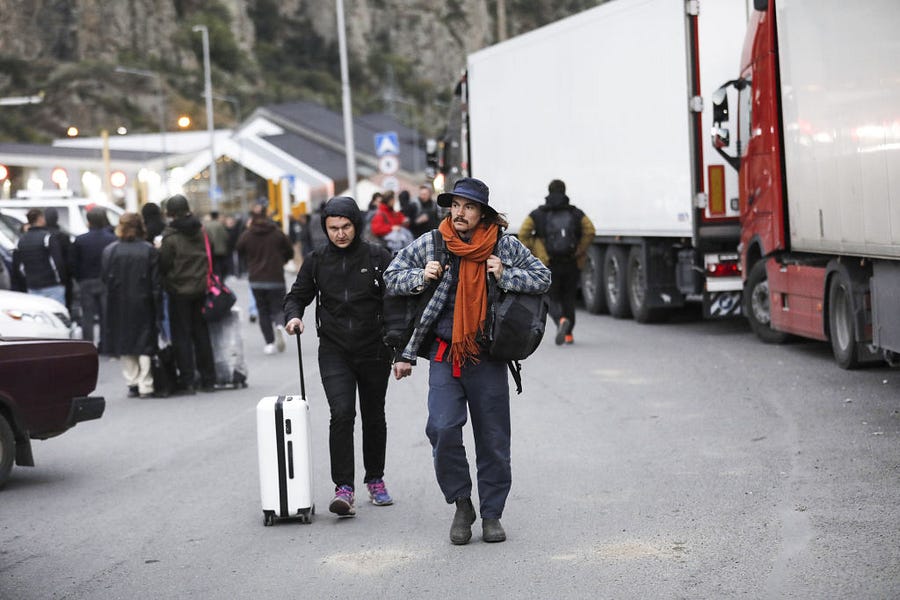ISTANBUL—Vlad left Russia shortly after his home country invaded Ukraine in February, but he reluctantly returned in August to put his affairs in order. Last week President Vladimir Putin threatened nuclear escalation and announced a partial mobilization, and the 27-year-old knew it was time to flee to Turkey again.
The conscription could press hundreds of thousands of Russians into the war to help replenish the military’s depleted ranks. Ukrainian forces have already killed or wounded some 80,000 Russian soldiers, according to a U.S. estimate. Vlad, who requested The Dispatch not publish his surname so he could speak freely, wasn’t interested in joining that long list of casualties.
Hundreds of thousands of other Russian nationals seem to feel the same way. Last week evacuees waited for hours at border crossings—on mopeds, bicycles, scooters, in cars, and on foot—in last-ditch efforts to reach border countries permitting their passage. Finland, Kazakhstan, Mongolia, and Georgia have collectively accepted nearly a quarter-million Russian citizens in recent days.
Others bought up the handful of flights destined for countries still accepting Russian aircraft, including Serbia, Armenia, and Turkey. “RUBLES ACCEPTED HERE” banners flashed across exchange offices in Istanbul International Airport last week. Some 3 million Russians traveled to Turkey last month alone, official data showed, a 23 percent year-over-year increase.
Driving much of the urgency is uncertainty about how long men will be permitted to leave the country. Sergei Tsekov, a Russian lawmaker, on Monday proposed cutting off the exodus. Authorities plan to set up stop points for men of military age and require them to secure special documentation to depart Russia, according to a Meduza report.
Others worry the draft will be much broader than the “partial mobilization” Putin described last week. Reports have already emerged of conscripts with little-to-no experience or training being deployed to the Ukrainian front. The Russian officials mustering reservists seem to care more about quotas than background checks.
“We are definitely seeing that there are men who have had previous military experience, but there are also men who have had none,” said Konrad Muzyka, director of Poland-based Rochan Consulting.
On Telegram feeds and in online guides, people exchange stories about military commissars going door-to-door with summonses and advice for avoiding detection.
“Everybody’s afraid that, sooner or later, there will be no way to escape whatsoever,” said Eva Rapoport, Istanbul coordinator for The Ark, a group helping opponents of the war escape persecution. The organization provides housing and community support to Russians trying to build new lives abroad, as well as free advice on things like obtaining humanitarian visas, applying for passports, and accessing finances.
The assistance is in greater demand as the U.S. and European Union seek to limit travel by Russians and cut Russian institutions out of the international financial system. In Turkey, private banks have begun to decouple with the MIR—Russia’s payment system—under threat of U.S. secondary sanctions. Turkish state banks reportedly plan to do the same. Telegram channels for recent Russian arrivals are currently flooded with questions about which ATMs will work with Russian cards, how to book accommodation, and where to exchange rubles for Turkish lira.
Finland, following the lead of the Baltic states and Poland, is expected to limit the number of Russians entering the country on tourist visas. In theory restrictions on Russian nationals are designed to foster internal resentment toward Putin, but some activists say the measures miss their intended target.
“I do think these sanctions, they’re hurting the wrong people,” Rapoport said. “It’s not affecting people who are in Russia and never planning on leaving Russia.” In her eyes, the fewer fighting-age men available to fuel the war effort, the better, and opponents to the regime are of more use abroad than behind bars.
As of Wednesday night, Russian authorities had detained more than 2,400 demonstrators for their opposition to last week’s mobilization. High-profile activists are targeted the most harshly, but the Kremlin also makes examples of rank-and-file dissidents with the occasional felony charge.
Vlad, who belongs to an unregistered opposition group, described the targeting of low-level activists as “Russian roulette.” It’s infrequent but inspires widespread fear and complicates the development of a coherent anti-government movement within the country.
“Inside of Russia, communication channels are really hard to come by. If you are a big political activist and you gain attention, you will get locked up,” he said. “If you are not a big political activist, you don’t know who to trust. Even if you’re a small fish, you can still get fried.”







Please note that we at The Dispatch hold ourselves, our work, and our commenters to a higher standard than other places on the internet. We welcome comments that foster genuine debate or discussion—including comments critical of us or our work—but responses that include ad hominem attacks on fellow Dispatch members or are intended to stoke fear and anger may be moderated.
With your membership, you only have the ability to comment on The Morning Dispatch articles. Consider upgrading to join the conversation everywhere.